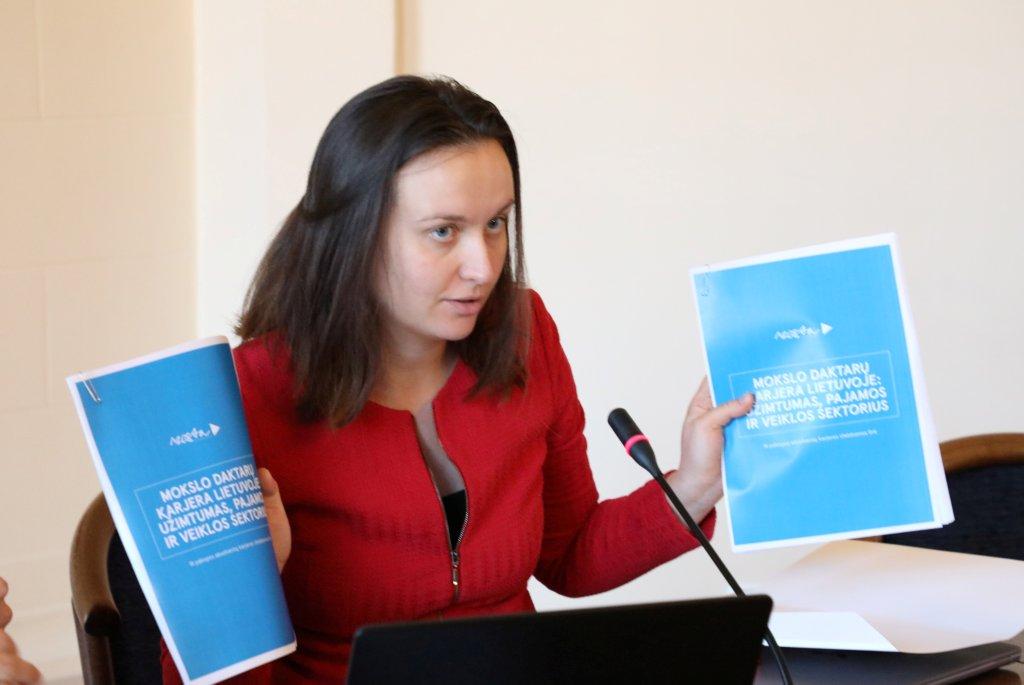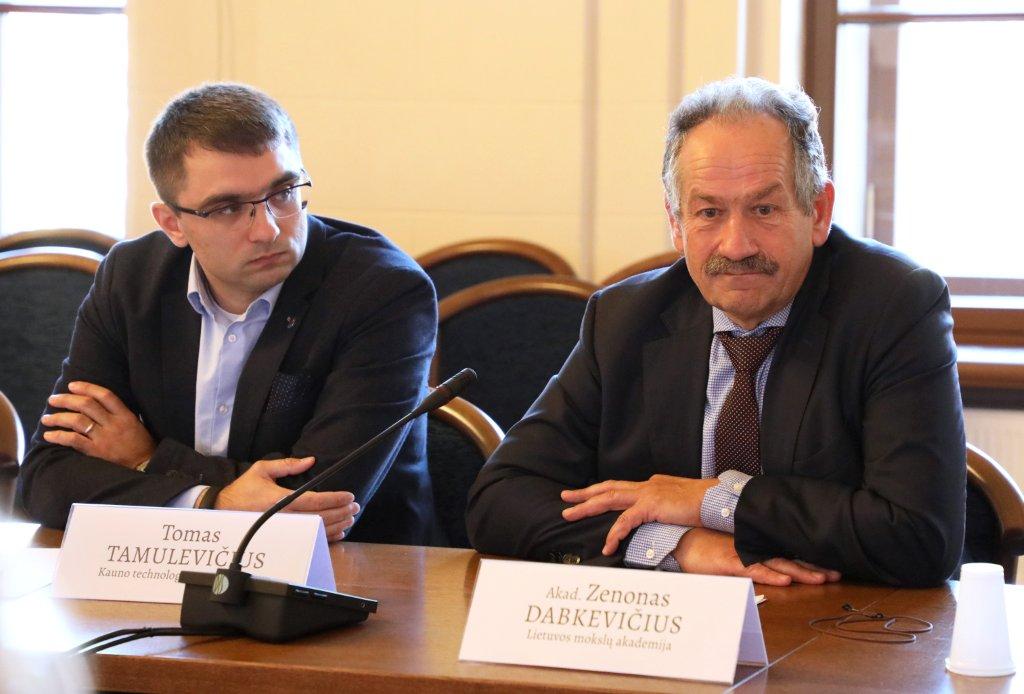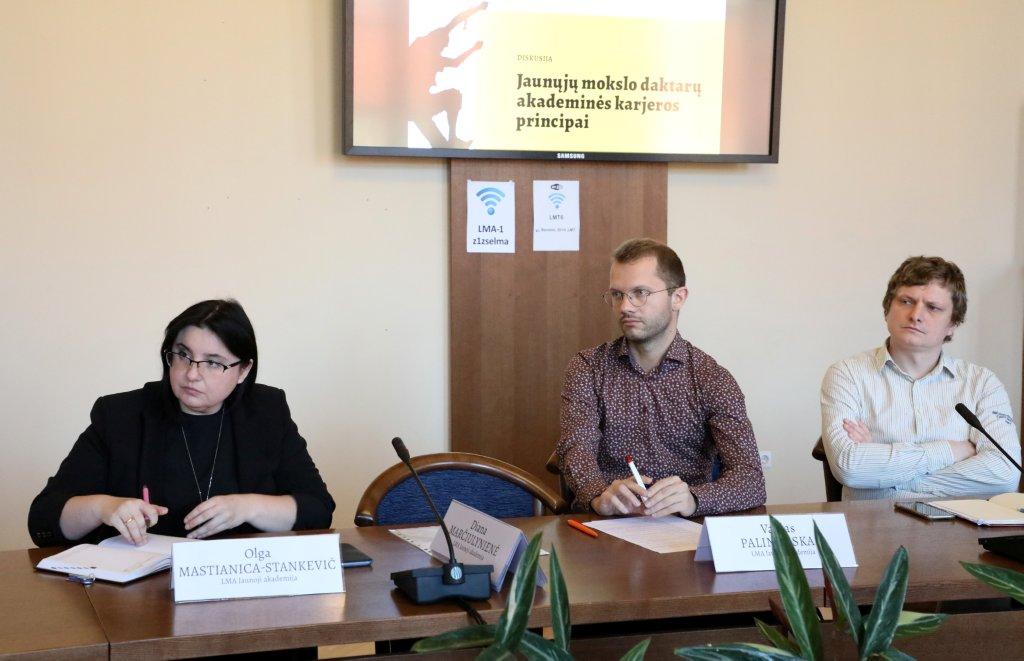Events
Enhancing the Academic Career of Young PhDs
28 10 2019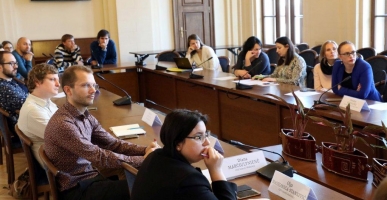
On 24 October 2019, the Young Academy of the Lithuanian Academy of Sciences organised an open discussion ‘The Principles of the Academic Career of Young PhDs’. As a representative of young researchers’ interests, the Young Academy notes that today, the academic career raises many challenges to the young PhDs, and these challenges are related not only to low salaries.
Taking the existing situation into account, the Young Academy of the Lithuanian Academy of Sciences invited institutions of research and higher education to contribute to the enhancement of young scientists’ careers and discuss the academic future and the principles of the career of young PhDs. Representatives of the Government Strategic Analysis Centre, the Lithuanian Research Council, Mykolas Romeris University, Kaunas University of Technology, the Lithuanian Agrarian and Forestry Research Centre, the Lithuanian Social Research Centre, the Lithuanian Energy Institute, and the Lithuanian Institute of History accepted the invitation and took part in the discussion.
The Academic Career of Young Doctoral Students and Related Research
In his welcome address, Prof. Zenonas Dabkevičius, Vice-president of the Lithuanian Academy of Sciences, emphasised the importance of the young researchers’ voice in Lithuanian research policy. Dr Donatas Murauskas, Chair of the Young Academy, presented the principles of the academic career of young PhDs and pointed out: ‘We are seeking an exhaustive discussion of these principles and that their introduction is not just a one-off event. The principles should be illustrated by actual examples of their implementation, which would form a set of good practices in the academic career of young researchers’.
At the discussion, Ramunė Dirvanskienė, a policy analyst from the Research Policy Analysis Department of the Government Strategic Research Centre, talked about the study ‘The Career of Doctorate Holders in Lithuania: Employment, Income, and the Sector of Activity’ conducted by the centre. She also introduced new research on the researchers’ working conditions and invited the representatives of research organisations to participate in it. The Young Academy of the Lithuanian Academy of Sciences stressed that the study into the working conditions of young researchers carried out by the Government Strategic Analysis Centre is highly relevant in enhancing the academic career of young PhDs. Therefore, the Young Academy seconds the invitation to participate in the study conducted by the Government Strategic Analysis Centre.
Ramunė Dirvanskienė, a policy analyst of the Department of Research Policy Analysis, the Government Strategic Analysis Centre
Dr Reda Cimmperman, the scientific secretary of the Lithuanian Research Council, emphasised that the council is doing all it can to facilitate the development of young scientists’ academic career by inviting young researchers to submit their research projects. At the same time, she emphasised the importance of institutional enhancement of young researchers’ careers.
Good Practices and Problem Areas
The representatives of research and higher education organisations were asked to share good practices of their institutions that helped to promote and guarantee the careers of young PhDs.
Prof. Regina Valutytė, Vice-rector of Mykolas Romeris University for Academic Affairs, pointed out that the approach to the academic career of young PhDs should be integrated, starting from doctoral studies that could be organised along the lines of the principles of the academic career of young PhDs proposed by the Young Academy of the Lithuanian Academy of Sciences. Talking of actual examples at Mykolas Romeris University, the vice-rector noted that the university organises social labs that are independent of faculties and other administrative divisions. In this way, the university implements the principle of academic openness proposed by the Young Academy, when an open space for interdisciplinary communication is set up.
Prof. Zenonas Dabkevičius, Vice-president of the Lithuanian Academy of Sciences, stressed the importance of immediate structural changes: doctoral studies should be approached not as the third stage of higher education but as the stage of scientific research activity. Assessing the work of the Lithuanian Agrarian and Forestry Research Centre, he said that the overall level of doctoral studies at the centre is high; the majority of the doctoral students take part in international scientific events and are involved in the research projects in progress. However, the engagement of research supervisors plays a significant role in a successful academic career of doctoral students and, later, young doctorate holders.
Prof. Tomas Tamulevičius of Kaunas University of Technology and Prof. Zenonas Dabkevičius, Vice-president of the Lithuanian Academy of Sciences
Prof. Tomas Tamulevičius and Dr Agnė Gadeikienė represented Kaunas University of Technology. They pointed out that their university implemented various practices promoting successful academic careers of young PhDs. For example, part of the university’s research fund is designated, by way of competition, to young PhDs (35 years of age and below) who have already achieved significant results; there is also a private foundation for support of postdoc internships. Prof. Tamulevičius added that Kaunas University of Technology established separate research groups matching the breakthrough themes, which matches some of the principles of the academic career of a young doctoral student proposed by the Young Academy: ‘balanced research’ and ‘consolidation of new fields’.
Karolina Čepurnienė, Head of the School for Doctoral Studies of Vytautas Magnus University, spoke about the university’s concern with the successful future academic career of young PhDs. The university implements doctoral students’ academic practice in research institutions, organises summer schools, and facilitates free-of-charge courses of foreign languages.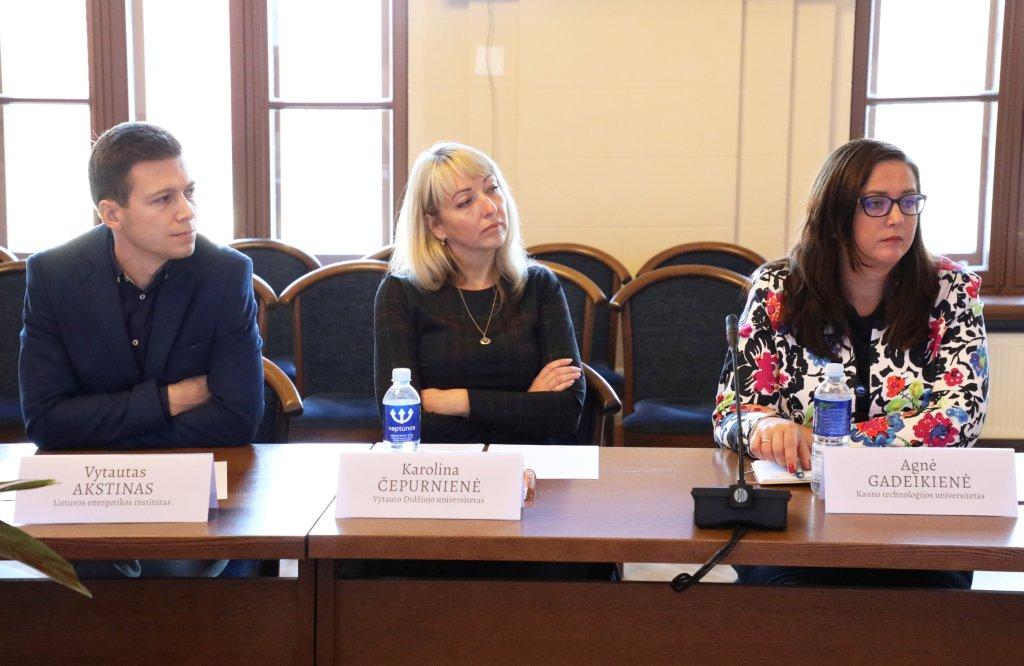
Dr Vytautas Akstinas (Lithuanian Energy Institute), Dr Karolina Čepurnienė (Vytautas Magnus University), Dr Agnė Gadeikienė (Kauno University of Technology)
Dr Andrius Vidikas and Dr Vytautas Akstinas of the Lithuanian Energy Institute spoke the involvement of young PhDs in research activities and their participation in shaping the institute’s research policy. Talking about the ‘focus on research’ principle, they singled out the importance of concentration on research at the institute.
Dr Donatas Burneika and Dr Daumantas Stumbrys, of the Lithuanian Social Research Centre, came forward with the suggestion that the size of various research and higher education institutions should be taken into account, and, bearing this in mind, more favourable possibilities for the academic career of young PhDs could be created. According to Dr Burneika, engaging young people in research activities should start not from their doctoral studies but from their work as lab technicians. Dr Stumbrys pointed out that many doctoral students and young PhDs are forced to seek jobs in several institutions of research and higher education as their employment at the institution of their studies and research is not always guaranteed.
Dr Jonas Paškauskas of the Lithuanian Institute of History agreed with the thoughts voiced by his colleagues from the Lithuanian Social Research Centre and observed that doctoral students must be very well aware of the amounts of money that could be allocated to their research work that would ensure their successful careers as doctorate holders.
Dr Mangirdas Malinauskas (Laser Research Centre, Vilnius University) and Dr Vaidas Palinauskas (Nature Research Centre), both members of the Young Academy of the Lithuanian Academy of Sciences, spoke about how actively the doctoral students in their centres engage in research and that an increase in scholarships makes it possible to attract doctoral students from other countries. Dr Malinauskas, however, was apprehensive of the fact that at present invitations to postdoc study visits are suspended, which weakens academic mobility and international activity of young doctoral students.
Dr Olga Mastianica-Stankevič, scientific secretary of the Young Academy of the Lithuanian Academy of Sciences, and members of this academy Dr Vaidas Palinauskas and Prof. Dr Edvinas Orentas
This event was the first attempt by the Young Academy at a broader discussion about the possibilities to improve the academic career of young PhDs. The Young Academy extended their sincere gratitude to the participants and will seek further cooperation with the Government Strategic Analysis Centre and research and higher education institutions, and elaboration on good institutional practices that would lead to the formulation of a valuable corpus of such practices based on the Principles of the Academic Career of Young PhDs. The Young Academy of the Lithuanian Academy of Sciences invites all centres of research and higher learning to aim for the implementation of these principles.
Principles of the Academic Career of Young PhDs
Dr Olga Mastianica-Stankevič and Dr Donatas Murauskas
Photo Virginija Valuckienė
